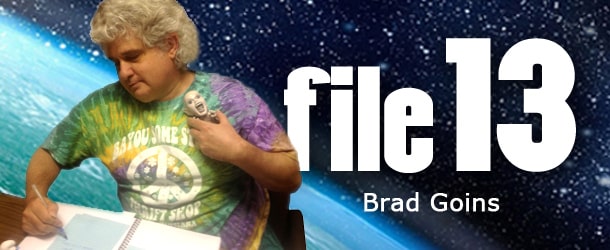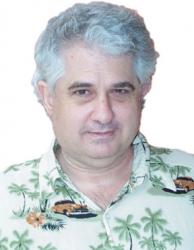From the beginning, Robin Williams was central to American culture. One reason I know this is that in the mid-1970s, a friend invited me over to watch a tape of a stand-up performance by a comedian named Robin Williams.
I’d seen nothing like it before and have seen nothing like it since. I’ve never heard anyone talk as fast as Robin Williams talked in that show. There was no point in comparing him to Jerry Lewis; this wasn’t Jerry Lewis on speed; this was Jerry Lewis on lots and lots of really potent speed.
Williams talked so fast it was impossible to make out every sentence, much less every word. When I could make out a sentence, it was invariably funny. The performance inspired me to think a great deal about whether Williams had improvised much of his often preposterous, absurd, fantastic, ridiculous material. After all, could any human being really write a script this long and skewed; memorize the whole thing; then spew it all out at this break-neck speed? Wasn’t it possible Williams was simply some sort of comedic god struck by Dionysian frenzies who created comedy as fast as he could make his lips move?
Whatever it was, this was a unique form of comedy. Robin Williams, whoever he was, was managing to create a comedic show that was, as an art work, everything that the Dadaists or the absurdists or Fluxus or such theatrical experimental composers as Harry Partch and Karlheinz Stockhausen could have wanted. (Williams certainly appeared to have an experimental and absurdist sensibility. About Robert Altman’s film Popeye [in which Williams starred], he said, “If you watch it backwards, it has a plot.”)
I’m not sure whether the TV show Mork and Mindy had aired at the time I viewed Williams’ early stand up performance. And I don’t remember whether I ever saw the show. But I did know Williams was in it, and that he repeatedly uttered the nonsense phrase, “nanu nanu.”
I guess I thought, on some level anyway, that “nanu nanu” was the shortest expression of a sense of human absurdity I’d ever heard in performance. Nanu nanu was certainly shorter than such popular absurd and absurdist Beatles phrases as “I am the walrus,” “I dig a pony” or “everybody’s got something to hide except for me and my monkey.” (In truth, “nanu nanu” may not have been any shorter than “hey, bulldog.” But I think it had even less chance of holding a hint of meaning than the latter phrase did.)
At any rate, “nanu nanu” became, for me, an extremely convenient expression of the absurd. I uttered the phrase frequently for years — often frequently enough that my friends complained about it. I didn’t care. I thought it was hilarious, and figured Williams must have been pretty sharp if he’d come up with it.
I don’t like talk shows and I rarely watch them. But, as I said at the start, Williams was always central to American culture. I somehow found myself watching him on a talk show at some point in the 1980s or 1990s. By this point, he had probably been in at least a couple of high profile films.
This time I didn’t enjoy the performance. Williams seemed like a kid on a sugar high trying to get the attention of his parents. He was literally bouncing off the walls. He jumped in and out of his chair. He couldn’t stay still. A couple of times he ran to a window and mimicked the movements of jumping out.
Far from humorous, it seemed (to me) pathetic for a fairly old man to behave this way. It was a lot easier to interpret Williams’ behavior on the show as some sort of performance art than to see it as comedy. But I’d been expecting comedy — or just a straightforward interview. I guess I wasn’t prepared for an art experience.
A couple of years ago, I got a copy of Williams’ brilliant 2009 HBO stand up special. If you haven’t seen this, or plan to see it soon, keep in mind that Williams delivered this marathon performance after he went through open-heart surgery.
Williams was much, much older than he had been in that 1970s stand-up gig, and he was no longer interested in expressing his sense of human absurdity with verbal or physical gymnastics. Instead, he dissected human foible after human foible in acute and merciless detail. Each time he spewed out a profanity, it was as if he were screaming at the audience: “Do you see the stupidity of this thing that people do as a matter of course? Does it make you feel like laughing and crying at the same time? Doesn’t it fill you with frustration? Doesn’t it make you want to holler?”
It was a long routine, and it worked because Williams was as funny as he had ever been. His obvious rage at the human animal was complemented by a bag full of hilarious lines.
While this old and battered Williams couldn’t possibly maintain the energy level of his 1970s persona, he nevertheless managed to be frenetic, racing back and forth across the stage, draining bottle after bottle of water, profusely sweating like the wild beast he was. And all the time he was doing this, he kept talking to the audience about the damage that had been done to his body by his injured heart and his long-term substance abuse.
When I learned about Williams’ death, I tried to avoid media coverage about it. I knew that because of the element of suicide, there’d be a media feeding frenzy that would last a minimum of two weeks. It would be more trouble than it was worth to try to get any useful information about Williams’ death in such a situation.
I did notice a line in an early NBC story that suggested that Williams had been concerned about the direction his career had taken. It certainly wasn’t that Williams had taken a distaste to work. He appeared in five to six movies a year right up to his last year. For a person who’d had open heart surgery, it was a remarkable work record.
Williams should have felt he was a supremely accomplished human being by virtue of having starred in such outstanding and demanding films as Moscow on the Hudson, Insomnia, One-Hour Photo and his masterpiece, Seize the Day. Just as exceptional an accomplishment was his pioneering of an entirely new, and probably inimitable, form of stand up comedy. He accomplished more than billions of people would in a hundred lifetimes.
But there may be a particular kind of suicidal ideation that such thoughts can’t penetrate. Concepts of the most obvious career accomplishments don’t compute. Kurt Cobain blew his brains out when he was the most esteemed of serious popular song writers and performers. David Wallace Foster blew his brains out when he was the most esteemed of serious fiction writers. Universal acknowledgement that Heath Ledger had turned in the acting performance of the millennium didn’t prevent him from killing himself. And Owen Wilson’s great comedic accomplishments didn’t prevent him from trying.
Perhaps if I’d been able to talk to another writer who recently blew his brains out — Richard Brautigan — before he did the deed, I could have conveyed to him what an extraordinary accomplishment I thought his work was. On the other hand, I’m not sure that would have been a good thing. I certainly have no interest in forcing people who’ve long been drowning in misery to keep on living. It’s possible that people such as Cobain and Brautigan had done all they could do for us and for themselves given the situations they were in. And, again, they certainly did more than enough. It would be selfish to drag them through years and years of acute suffering just so we could have a few more books and CDs.
As for Williams, when he died, he was, after all, 63 years old. For years, I was told that when Virginia Woolf committed suicide it was a great tragedy. Then, one day, I learned that she was 64 when she killed herself. I wondered what part of this story I was missing.
I wonder whether we ever reach the point where we’re willing to say, “Thank you! You’ve been wonderful. You’ve given us everything we could ever have dreamed of and more. Now please, forget about us. Attend to yourself now. You’ve more than earned the opportunity to do so.”
Is there some part of me so callous that it wants Virginia Woolf to write The Waves, then hang around a few more years so that I can have a better book to read? I hope not. If anything, I tend to feel uneasy because I know all too well how long and how intensely she suffered.
My father worked hard, ate good food and had a healthy lifestyle. And he died at exactly the same age Virginia Woolf did — 64; not from suicide, of course, but from cancer. I don’t think he died fretting about whether he had accomplished this or that. Rather, I think he took death as he took life — as he found it.
For better or worse, Robin Williams didn’t have that ability. He had a painfully acute awareness of the human animal exactly as it is. All good comedians do. It is the comedian’s curse.
I think it was the comedy writer Chekov who said tragedians see life as a tragedy but live it as if it were a comedy, while comedians see life as a comedy but live as if it were a tragedy. Many of us are fortunate in that we can laugh at that absurd manifestation of the human state.
As long as I live, Robin Williams won’t be forgotten. As long as I live, I’ll deliver my eulogy: “nanu nanu.” And if I ever meet any aspiring stand up comedians, I’ll tell them, “Strive to do what this fellow did.”















Comments are closed.